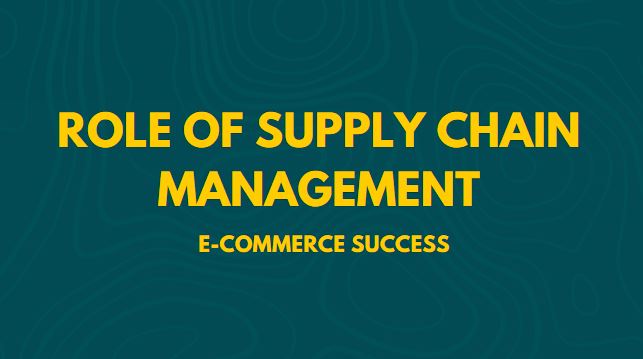
Introduction: The Backbone of Online Retail
In today’s fast-paced digital world, e-commerce has become integral to our lives. From ordering groceries to purchasing high-end electronics, online shopping has revolutionized how we buy and sell goods. But have you ever wondered what goes on behind the scenes to ensure that your order reaches you on time and in perfect condition? The answer lies in the complex and fascinating world of supply chain management.
Supply chain management is the unsung hero of e-commerce, working tirelessly to coordinate the flow of goods, information, and finances from manufacturers to consumers. As online businesses continue to grow and evolve, the importance of effective supply chain management cannot be overstated.
In this blog post, we’ll explore the weightage of supply chain management in e-commerce websites and businesses and why it’s become a critical factor in determining success in the digital marketplace.
The Pillars of E-commerce Supply Chain Management
Inventory Management: Striking the Perfect Balance
Inventory management is one of the most crucial aspects of supply chain management in e-commerce. Keeping enough stock to meet customer demand without tying up too much capital in excess inventory is a delicate balancing act. Effective inventory management ensures that popular items are always available while minimizing the risk of overstocking slow-moving products.
- Real-time inventory tracking
- Demand forecasting
- Just-in-time inventory systems
- Safety stock calculations
By implementing these strategies, e-commerce businesses can reduce storage costs, prevent stockouts, and improve cash flow. This level of precision in inventory management is only possible with a strong foundation in supply chain principles and practices.
Order Fulfillment: The Race Against Time
In the world of e-commerce, speed is king. Customers expect their orders to be processed and shipped quickly, often within hours of placing them. This is where efficient order fulfillment comes into play. A well-oiled supply chain ensures that orders are picked, packed, and shipped efficiently.
- Optimized warehouse layouts
- Advanced picking technologies (e.g., voice-directed picking, pick-to-light systems)
- Automated packing systems
- Integration with multiple shipping carriers
These elements work together to reduce processing times, minimize errors, and get products into customers’ hands as quickly as possible. Consistent meeting or exceeding customer expectations in this area can be a significant competitive advantage for e-commerce businesses.
Logistics and Transportation: Navigating the Last Mile
The journey of a product doesn’t end when it leaves the warehouse. Getting it to the customer’s doorstep – often called “last-mile delivery” – is a critical part of the e-commerce supply chain. This stage can be one of the process’s most challenging and costly aspects.
- Route optimization
- Real-time tracking and visibility
- Multiple delivery options (e.g., same-day, next-day, click-and-collect)
- Reverse logistics for returns and exchanges
Effective logistics and transportation management can reduce shipping costs, improve delivery times, and enhance customer satisfaction. It’s a complex puzzle that requires expertise in supply chain management to solve effectively.
The Impact of Supply Chain Management on Customer Experience
Meeting and Exceeding Expectations
In the competitive world of e-commerce, customer experience is everything. A smooth, efficient supply chain directly translates to a positive customer experience. When orders are fulfilled quickly and accurately, when products arrive on time and in good condition, and when returns are processed seamlessly, customers are more likely to become loyal repeat buyers.
“The best supply chains aren’t just fast and cost-effective. They are also agile and adaptable, and they ensure all their companies’ interests stay aligned.” – Hau L. Lee, Professor of Operations, Information & Technology at Stanford Graduate School of Business.
This quote highlights the multifaceted nature of supply chain management and its direct impact on customer satisfaction. By creating a responsive and flexible supply chain, e-commerce businesses can adapt to changing customer needs and market conditions, staying ahead of the competition.
Building Trust Through Transparency
Modern consumers value transparency in their shopping experiences. They want to know where their products are coming from, how they’re being made, and where they are in the delivery process. A well-managed supply chain can provide this level of visibility.
- Ethical sourcing information
- Real-time order tracking
- Clear communication about stock levels and expected delivery dates
- Detailed product origin and manufacturing information
By leveraging supply chain data and processes, e-commerce businesses can build customer trust, fostering long-term relationships and brand loyalty.
The Competitive Edge: How Supply Chain Management Drives Growth
Cost Reduction and Efficiency Gains
One of the most significant benefits of effective supply chain management in e-commerce is the potential for cost reduction and increased efficiency. By optimizing each link in the chain, businesses can:
- Reduce inventory holding costs
- Minimize transportation expenses
- Streamline operations to reduce labor costs
- Improve cash flow through better inventory turnover
These cost savings can be passed on to customers through competitive pricing or reinvested in the business to fuel growth and innovation.
Scalability and Expansion
As e-commerce businesses grow, their supply chain needs become more complex. A robust supply chain management strategy allows for scalability, enabling businesses to expand their product offerings, enter new markets, and handle increased order volumes without sacrificing efficiency or customer satisfaction.
- Multi-channel fulfillment capabilities
- International shipping and customs management
- Adaptive capacity planning
- Flexible supplier relationships
By building a scalable supply chain, e-commerce businesses can confidently seize growth opportunities, knowing they have the infrastructure to support expansion.
The Future of Supply Chain Management in E-commerce
Embracing Technology and Innovation
The future of supply chain management in e-commerce is closely tied to technological advancements. As we move forward, we can expect to see increased adoption of:
- Artificial Intelligence and Machine Learning for demand forecasting and inventory optimization
- Internet of Things (IoT) devices for real-time tracking and monitoring
- Blockchain technology for enhanced transparency and traceability
- Robotics and automation in warehousing and fulfillment
These technologies have the potential to revolutionize supply chain management, making it even more critical for e-commerce success in the years to come.
Sustainability and Ethical Considerations
As consumers become more environmentally conscious, e-commerce businesses are under increasing pressure to develop sustainable and ethical supply chains. This includes:
- Reducing carbon footprints through optimized transportation routes
- Implementing eco-friendly packaging solutions
- Ensuring fair labor practices throughout the supply chain
- Supporting local and sustainable suppliers
Focusing on sustainability in supply chain management appeals to environmentally conscious consumers and can lead to long-term cost savings and improved brand reputation.
Conclusion: The Path to E-commerce Excellence
As explored throughout this blog post, the weightage of supply chain management in e-commerce websites and businesses cannot be overstated. It touches every aspect of the online retail experience, from inventory management and order fulfillment to customer satisfaction and business growth.
For students and working professionals looking to make their mark in the world of e-commerce, developing expertise in supply chain management is a smart career move. An Online PGDM in Logistics and Supply Chain Management can provide the knowledge and skills needed to excel in this critical field.
By mastering the principles of supply chain management, you’ll be well-equipped to tackle the challenges of modern e-commerce, drive innovation, and contribute to the success of online businesses. Whether you’re just starting your career or looking to advance to the next level, investing in supply chain management education can open doors to exciting opportunities in the ever-growing world of e-commerce.
Remember, a well-managed supply chain in the digital marketplace isn’t just a competitive advantage – it’s the foundation upon which successful e-commerce businesses are built. As you consider your future in this dynamic field, ask yourself: Are you ready to be at the forefront of the e-commerce revolution, armed with the power of supply chain management expertise?


